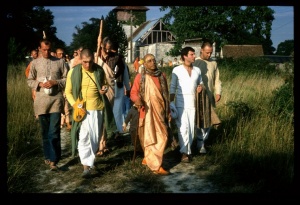CC Madhya 16.263-264 (1975): Difference between revisions
(Vanibot #0027: CCMirror - Mirror CC's 1996 edition to form a basis for 1975) |
(Vanibot #0020: VersionCompareLinker - added a link to the Version Compare feature) |
||
| Line 2: | Line 2: | ||
<div style="float:left">'''[[Sri Caitanya-caritamrta (1975)|Śrī Caitanya-caritāmṛta (1975)]] - [[CC Madhya (1975)|Madhya-līlā]] - [[CC Madhya 16 (1975)|Chapter 16: The Lord's Attempt to Go to Vṛndāvana]]'''</div> | <div style="float:left">'''[[Sri Caitanya-caritamrta (1975)|Śrī Caitanya-caritāmṛta (1975)]] - [[CC Madhya (1975)|Madhya-līlā]] - [[CC Madhya 16 (1975)|Chapter 16: The Lord's Attempt to Go to Vṛndāvana]]'''</div> | ||
<div style="float:right">[[File:Go-previous.png|link=CC Madhya 16.262 (1975)|Madhya-līlā 16.262]] '''[[CC Madhya 16.262 (1975)|Madhya-līlā 16.262]] - [[CC Madhya 16.265-266 (1975)|Madhya-līlā 16.265-266]]''' [[File:Go-next.png|link=CC Madhya 16.265-266 (1975)|Madhya-līlā 16.265-266]]</div> | <div style="float:right">[[File:Go-previous.png|link=CC Madhya 16.262 (1975)|Madhya-līlā 16.262]] '''[[CC Madhya 16.262 (1975)|Madhya-līlā 16.262]] - [[CC Madhya 16.265-266 (1975)|Madhya-līlā 16.265-266]]''' [[File:Go-next.png|link=CC Madhya 16.265-266 (1975)|Madhya-līlā 16.265-266]]</div> | ||
{{CompareVersions|CC|Madhya 16.263-264|CC 1975|CC 1996}} | |||
{{RandomImage}} | {{RandomImage}} | ||
| Line 8: | Line 9: | ||
<div class="verse"> | <div class="verse"> | ||
:tāṅra dainya | :tāṅra dainya dekhi' śuni' pāṣāṇa bidare | ||
:āmi tuṣṭa hañā tabe kahiluṅ doṅhāre | :āmi tuṣṭa hañā tabe kahiluṅ doṅhāre | ||
: | :"uttama hañā hīna kari' mānaha āpanāre | ||
:acire karibe kṛṣṇa tomāra | :acire karibe kṛṣṇa tomāra uddhāre" | ||
</div> | </div> | ||
| Line 18: | Line 19: | ||
<div class="synonyms"> | <div class="synonyms"> | ||
tāṅra dainya | tāṅra dainya dekhi'-by seeing their humility; śuni'-or even hearing about it; pāṣāṇa—stone; bidare—becomes melted; āmi—I; tuṣṭa hañā—being very pleased; tabe—then; kahiluṅ doṅhāre—said to both of them; uttama hañā—being actually superior in every respect; hīna—inferior; kari'-proposing as; mānaha—you accept; āpanāre—yourselves; acire—very soon; karibe—will do; kṛṣṇa—Lord Kṛṣṇa; tomāra—of you; uddhāre—liberation. | ||
</div> | </div> | ||
| Line 25: | Line 26: | ||
<div class="translation"> | <div class="translation"> | ||
"Indeed, the humility of these two brothers could even melt stone. Because I was very pleased with their behavior, I told them, 'Although you are both very exalted, you consider yourselves inferior, and because of this, Kṛṣṇa will very soon deliver you.' | |||
</div> | </div> | ||
==== PURPORT ==== | ==== PURPORT ==== | ||
<div class="purport"> | <div class="purport"> | ||
Such are the qualifications of a pure devotee. Materially one may be very opulent, experienced, influential and educated, but if one still thinks himself lower than straw in the street, one attracts the attention of Śrī Caitanya Mahāprabhu or Lord Kṛṣṇa. Although Mahārāja Pratāparudra was a king, he took up a broom to cleanse the road for Lord | Such are the qualifications of a pure devotee. Materially one may be very opulent, experienced, influential and educated, but if one still thinks himself lower than straw in the street, one attracts the attention of Śrī Caitanya Mahāprabhu or Lord Kṛṣṇa. Although Mahārāja Pratāparudra was a king, he took up a broom to cleanse the road for Lord Jagannātha's Ratha chariot. Because of this humble service, Śrī Caitanya Mahāprabhu was very pleased with the King, and for that reason the Lord embraced him. According to Śrī Caitanya Mahāprabhu's instructions, a devotee should never be puffed up by material power. He should know that material power is the result of one's past good activities (karma) and is consequently transient. At any moment all one's material opulence can be finished; therefore a devotee is never proud of such opulence. He is always humble and meek, considering himself lower than a piece of straw. Because of this, the devotees are eligible to return home, back to Godhead. | ||
</div> | </div> | ||
Latest revision as of 10:03, 27 January 2020

A.C. Bhaktivedanta Swami Prabhupada
TEXTS 263-264
- tāṅra dainya dekhi' śuni' pāṣāṇa bidare
- āmi tuṣṭa hañā tabe kahiluṅ doṅhāre
- "uttama hañā hīna kari' mānaha āpanāre
- acire karibe kṛṣṇa tomāra uddhāre"
SYNONYMS
tāṅra dainya dekhi'-by seeing their humility; śuni'-or even hearing about it; pāṣāṇa—stone; bidare—becomes melted; āmi—I; tuṣṭa hañā—being very pleased; tabe—then; kahiluṅ doṅhāre—said to both of them; uttama hañā—being actually superior in every respect; hīna—inferior; kari'-proposing as; mānaha—you accept; āpanāre—yourselves; acire—very soon; karibe—will do; kṛṣṇa—Lord Kṛṣṇa; tomāra—of you; uddhāre—liberation.
TRANSLATION
"Indeed, the humility of these two brothers could even melt stone. Because I was very pleased with their behavior, I told them, 'Although you are both very exalted, you consider yourselves inferior, and because of this, Kṛṣṇa will very soon deliver you.'
PURPORT
Such are the qualifications of a pure devotee. Materially one may be very opulent, experienced, influential and educated, but if one still thinks himself lower than straw in the street, one attracts the attention of Śrī Caitanya Mahāprabhu or Lord Kṛṣṇa. Although Mahārāja Pratāparudra was a king, he took up a broom to cleanse the road for Lord Jagannātha's Ratha chariot. Because of this humble service, Śrī Caitanya Mahāprabhu was very pleased with the King, and for that reason the Lord embraced him. According to Śrī Caitanya Mahāprabhu's instructions, a devotee should never be puffed up by material power. He should know that material power is the result of one's past good activities (karma) and is consequently transient. At any moment all one's material opulence can be finished; therefore a devotee is never proud of such opulence. He is always humble and meek, considering himself lower than a piece of straw. Because of this, the devotees are eligible to return home, back to Godhead.